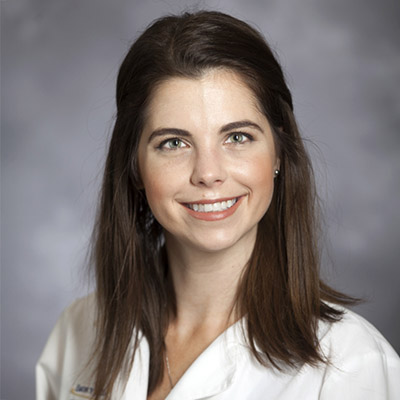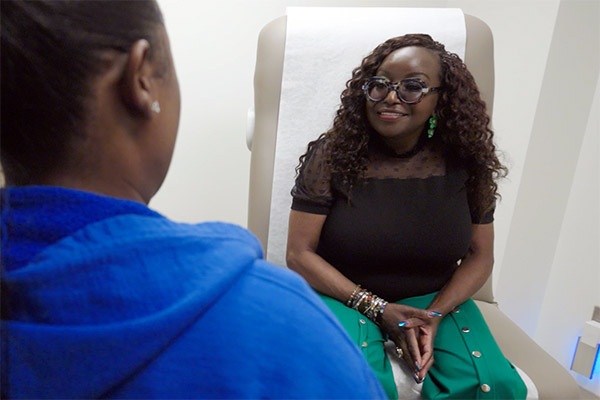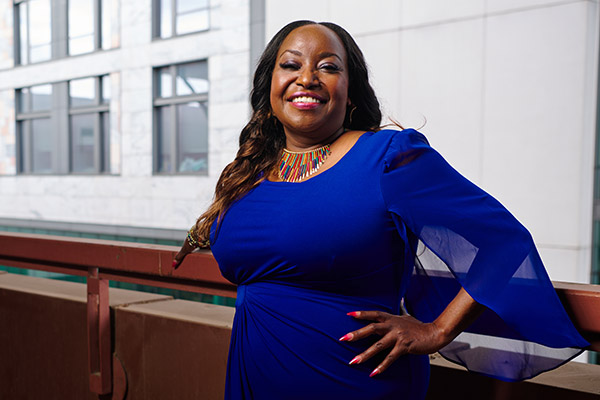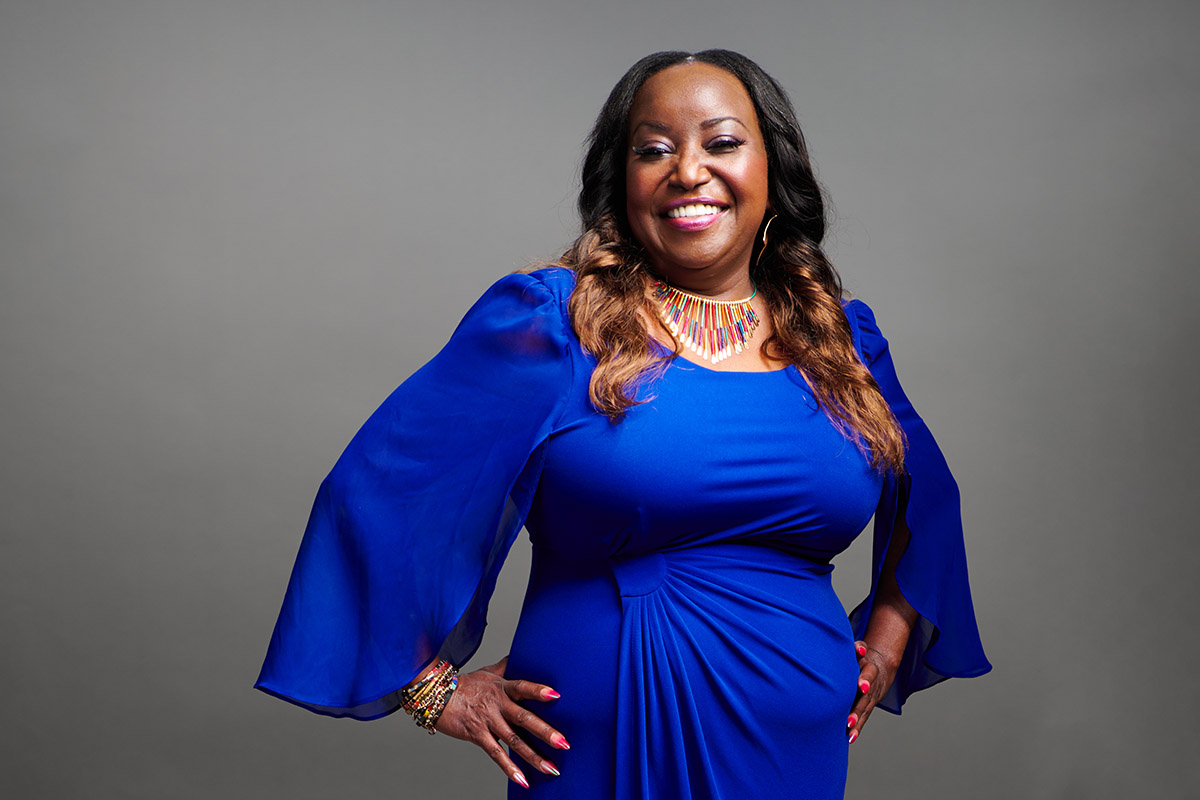It would be great for every patient to see their cancer care team as a partnership with you, not as somebody who is treating you just because you’re sick.
Esther's Doctor
-
Jean L. Koff, MD, MS Associate Professor, Department of Hematology and Medical Oncology

Born and raised in Kenya, Esther has known life’s challenges — and developed strong emotional resilience.
In 2006, Esther received a kidney transplant and in March 2022 she was diagnosed with post-transplant lymphoproliferative disorder. PTLD is a serious complication after an organ or stem cell transplant characterized by an uncontrolled growth of lymphocytes (white blood cells) due to a weakened immune system and, often, EBV (Epstein-Barr virus) infection.
“I kept wondering why I was losing so much weight,” Esther says. “I was also feeling very fatigued.” After feeling a lot of pain one day, she went to the emergency room — and wound up needing emergency surgery. “I had a very big tumor.”
Esther’s nephrologist at Emory referred her to Jean Koff, MD, MS, a hematologist at Winship Cancer Institute of Emory University specializing in the treatment of lymphoid malignancies. Koff diagnosed Esther with PTLD.
Esther recalls being “in a lot of shock” upon receiving this news, yet she was happy to have a diagnosis and know what was happening inside her body.
A partner in her own care

Esther during a visit to the clinic at Winship.
From their first meeting, Esther was excited to work with Koff. “She knew my history. She was working with my transplant doctors. It’s just a nice feeling for a patient when you have a doctor who walks in and has your history. It makes you feel confident like ‘I’m in the right place.’” She appreciated that Koff explained PTLD and their next steps.
Esther’s first treatment was immunotherapy, which turned out to be only partly effective against her aggressive cancer. Next up was a type of chemotherapy used for patients with lymphoma and safe enough for patients who have had a transplant. “It was a hard treatment, but at least it worked,” Esther says.
She also did seven months of water therapy, a type of rehabilitation that involves exercises performed in a temperature-controlled pool, and physical therapy to treat the painful effects on her bones as a result of the additional prednisone she had to take on top of the long-term prednisone she already had been taking since her transplant.
“Most of my challenges were very well addressed,” Esther says, “but not just addressed as a number, as someone who has cancer, but as a human who is going through challenges and who needs that level of support.”
Esther particularly appreciates the connection and sense of partnership she felt with Koff and her care team. “It would be great for every patient to see their cancer care team as a partnership with you, not as somebody who is treating you just because you’re sick,” she says.
From her perspective, Koff says, “It’s important for patients to view their cancer care team as partners to make sure they feel supported and informed when they make decisions with their care providers about next steps during workup at diagnosis, during treatment and during recovery after treatment.”
Building that partnership and trust makes you “able to communicate well about barriers you’re having, challenges that you’re having — or things that went well,” says Esther. She recommends focusing on the good things that await on the other side of treatment — not on your present suffering. “That really helps you to do well, to reduce the suffering, to enjoy the journey, to celebrate every milestone and to look forward to your future.”
Sharing her resilience

“I’m a very positive person, also very resilient,” Esther says. “I’m not scared of mountains and hardship. I’ve already had that in my childhood because actually I was orphaned at the age of eight. So I’ve had to figure out life, and I always have had a very positive outlook.”
Koff invited Esther to become a member of the Patient Advisory Council on the Lymphoma Epidemiology of Outcomes (LEO) cohort study. The goal of the LEO study is to build and maintain a large and diverse cohort of patients with non-Hodgkin lymphoma to support a broad research agenda aimed at identifying new clinical, epidemiologic, genetic, tumor and treatment factors that influence outcome and the overall survivorship experience.
The patient advisors are patients and survivors with lymphoma from each of the eight cancer centers that participate in the study. They share their experiences and insights on what it’s like to be a patient with lymphoma and a participant in the study, how the experience could be improved, what research areas are most important to patients and how researchers can best communicate their findings to patients. Koff says Esther “was an easy choice to act as a representative on the advisory council, and I’m so glad she said yes to this role. From day one she has been very engaged in her lymphoma care, and she is passionate about easing the cancer experience for other patients.” From her point of view, Esther says, “I feel very useful and valued and I love every bit of being on the advisory council.”
Esther recognizes that not everyone has developed the same level of resilience as herself — the reason she is dedicated to helping other people with cancer find theirs. “I’m hoping to help people learn how to be resilient and learn how to be part of their care team and not resist the advice that they get from their doctors,” she says. “Being able to be part of that team and to contribute and know that I can improve the values of life, especially for patients with lymphoma, is just so rewarding. It’s so fulfilling.”
Two years on from her own treatment, Esther is still in remission. “I’m just enjoying every milestone as I’m getting better and better, and stronger and stronger,” she says. “I’m super excited to have my weight back, look normal — things people don’t really think about or appreciate. I’m just happy to be able to make choices, to have a life, really, and to feel that everything is getter better.”
As she enjoys the things she loves most — her family and spending time with them, learning new things, cooking and “adventuring” in different restaurants, self-improvement, meeting new people, mentoring young people and helping others affected by cancer — Esther says, “At this time, I’m just living the best part of my life.”
Care tailored to your needs
Care for patients with lymphoma at Winship includes leading cancer specialists collaborating across disciplines to tailor treatment plans to each patient’s needs; innovative therapies and clinical trials; comprehensive patient and family support services; and a care experience aimed at easing the burden of cancer.

